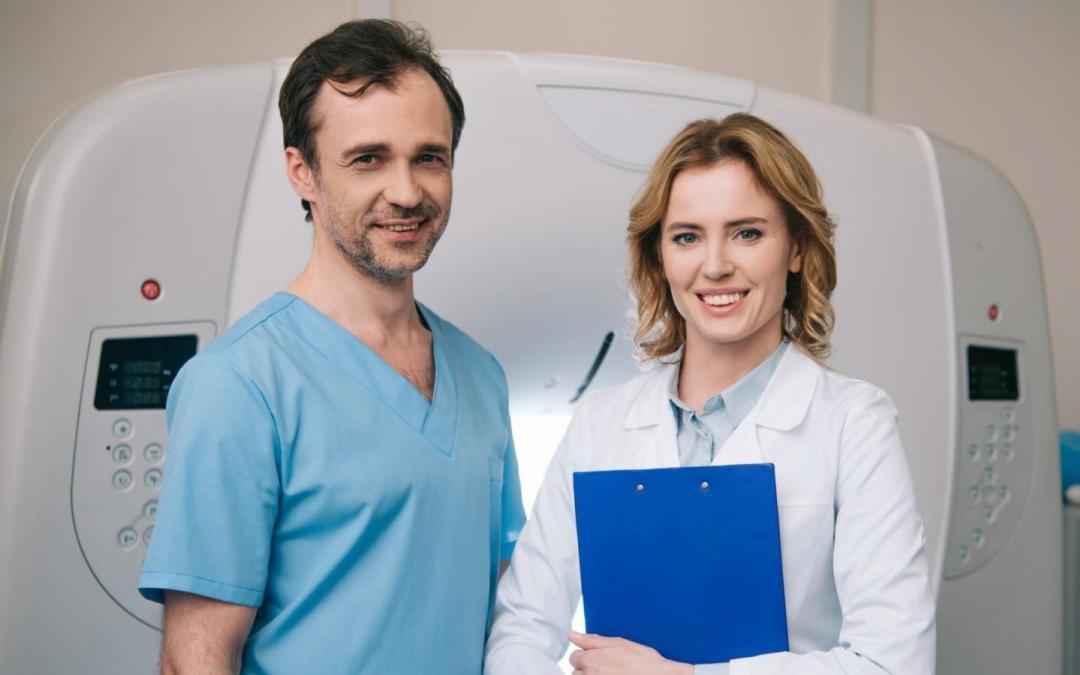
by Josh Seaman | Jul 29, 2022 | Employment Agencies, Healthcare & Medicine, Medical, Recruitment Agencies
People with disabilities, chronic sickness, ageing, and other long-term problems rely on occupational therapists to assist them in their daily lives. Helping folks overcome numerous obstacles so that they may live as independently as feasible is what you’ll be doing in this position. In some instances, you may be teaching someone a new method to work, or making modifications to their current setting, so that their daily routines become more manageable.
In your job as an occupational therapist, you’ll have the opportunity to work with people from all walks of life. You’d be supporting patients recuperating from major surgery or a severe injury, persons with mental disorders, people with special education needs, and those who are elderly.
When dealing with any of the following, you may need to change their work or home environment to make it more accommodating. You might, for example, arrange for stairlifts or level access showers for an older person who desires to remain independent.
Working with patients and their families to improve their quality of life is one of the most fulfilling aspects of becoming an occupational therapist. Supporting an individual’s ability to live on their own might help alleviate the stress on their loved ones. Clients and their support networks aren’t the only ones you’d be working with; you’d also be working in different groups or as part of a multidisciplinary team. Hospitals, clinics, charities, jails, and social services departments are examples of these situations.
Duties and Responsibilities
Occupational therapists assess patients on more than just their ability to move freely. To help individuals have whole and meaningful lives, they provide practical answers. Occupation therapists have a wide range of responsibilities based on the industry they operate in and the people they help. However, most of their work occurs in healthcare facilities or the community.
An occupational therapist’s duties often include the following:
- The physical, verbal, interpersonal, and cognitive abilities of a patient are evaluated.
- Developing and implementing a treatment plan and activities that are suitable
- Recommending and organizing assistance for loved ones, caregivers, or clients
- Routine clerical duties, such as preparing reports, making phone calls, and maintaining files and case notes
- Keeping other medical professionals, such as physicians, family members, and caregivers, updated on the patient’s condition and treatment plan.
- Participating in multi-professional case meetings to evaluate treatment outcomes
- advising others on the best ways to accomplish their daily duties
- It’s all about making the environment more accessible for persons with disabilities – whether it’s at home or work.
Skills
Like any other career, becoming an occupational therapist requires numerous personal qualities. This is a public-facing job; therefore, you will meet new individuals every day. So your interpersonal skills must be superb. An occupational therapist must immediately establish relationships with a variety of clients.
You must be patient, sympathetic, and eager. You can make the difference between someone walking after a significant operation and being in the hospital. Positive thinking helps someone to release and recuperate.
Occupational therapists must be quick on their feet. If a patient’s therapy isn’t working, the capacity to immediately shift course is required. It would help if you also work effectively in a team since you will be interacting with other healthcare professionals.
Occupational therapists must be adaptable while dealing with patients’ highs and lows. Flexibility is vital while working with patients since their needs may alter at any time.
Occupational therapists must be effective communicators. This involves clear written and vocal communication to correctly identify patient requirements and explain treatment procedures. They must also collaborate with other healthcare experts and record treatment plans and progress.
If you want to work in occupational therapy, you need to know how to get there. Like many other healthcare professions, occupational therapy requires substantial study and training to get certified. Most occupational therapists have a master’s degree, but others opt to obtain a doctorate to succeed in their industry.

by Josh Seaman | Jul 8, 2022 | Employment Agencies, Healthcare & Medicine, Medical, Recruitment Agencies
Has it ever crossed your mind how it is like to work as a dental assistant? You’re not the only one with that thought in mind. Many people aspire to work in dental assisting. Working as a dental assistant can be rewarding on many levels, including both professionally and personally. Dentists and hygienists will rely on you as a Dental Assistant. A Dental Assistant will do everything from making patients feel welcome, helping them relax, making them comfortable, and explaining what is going on.
Let’s look at the top reasons you should work as a dental assistant.
High Demand
When it comes to choosing a career path, dental assistants have a lot going for them. Since dental offices cannot function without a Dental Assistant, this position is expected to remain in high demand for years to come. It’s great to know that you can expect a bright future as a dental assistant if you enrol in this program. The advantages of being a dental assistant are immense, and the career is considered the perfect blend of fun and professionalism. Just imagine working in an environment where your job requires you to work with all sorts of people and offers you the opportunity to make an impact on their lives.
As the population grows, so does the demand for dental care. People are seeking preventative dental care more willfully. You’ll also have a more extensive patient base because older people are more likely to keep their teeth now than in the past. Remember that dental assistants are sought by general and speciality dentists, including Endodontists, Orthodontists, and Oral Surgeons. As a result, Dental Assistants can find work no matter where they live.
Income
Dental Assistants make excellent money, especially when you consider how little schooling they need to get started. In Australia, dental assistants earn an average yearly salary of $59,640. There are no educational or certification requirements for dental assistants to work in this field. Many are “trained on the job”.
Career Growth
As a Dental Assistant, you’ll never have the same day two days in a row. If you’re interested in dentistry, this is a great way to get your feet wet, learn about the field, and gain practical experience. In this position, you’ll get a good understanding of what it takes to operate a dental practice, from front desk operations to patient care. Dental Assisting is often a stepping stone to other healthcare careers such as dental hygienists, dental office managers, insurance claim processing and coding specialists. You can make up to $70,000 a year in these fields.
Workplace
An exciting, fast-paced, and dynamic job awaits you in a dental office! You will be working in an environment where you will be surrounded by hard-working people. Dental assistants can work in various settings, including private practice, clinics, schools, and hospitals. There are many specialities in dentistry that you can choose from when working in a dental office.
Rewarding Career
A Dental Assistant needs to put patients at ease and listen to their concerns. As a result, customer service and effective communication are two of the most critical skills required for this position. There is a tremendous feeling of pride that comes with making patients your number one priority every single day. Dental assistants are likely to talk about their patients and the joy they get from helping them improve their quality of life when asked about their job. Make a positive impact on someone’s day, and you’ll never be happier!

by Josh Seaman | Jun 17, 2022 | Employment Agencies, Healthcare & Medicine, Medical, Recruitment Agencies
The job of a nurse can be challenging. As a result, it presents a variety of both physical and emotional challenges. On the other hand, being a nurse can be incredibly rewarding and beneficial in a variety of ways, making it an excellent long-term career option.
If you are considering becoming a nurse, it is essential to do your research on the work you will be doing. This may help you decide if this is an excellent career path for you. It can also help you build a successful resume that showcases your strengths and experience in the field.
A deep sense of fulfilment can be found in this line of work. Nursing is a rewarding career that offers a variety of rewards, including the chance to see babies take their first breaths and the bonds formed with patients as a result of the work they do. Nurses have the power to leave an imprint on the lives of those they serve that they will never be able to forget.
Below are some of the reasons why being a nurse is a fulfilling career:
Workplaces
As a nurse, you can choose from a wide range of specialities, as well as a variety of workplaces. Hospitals, doctors’ offices, psychiatric facilities, and even in-home care are examples of these. They can work in the public health field, in community health, as a consultant, or even as an instructor.
As a nurse, you will be part of a team providing quality care to patients and families. You may be working with doctors, other nurses, psychologists, physiotherapists, occupational therapists, social workers, nutritionists, pharmacists, radiographers and many others.
You can also work as a nurse overseas. It’s an excellent way to get some further experience in your field. If you work overseas, you’ll have the opportunity to improve your nursing skills as well as learn new ones. You’ll also be able to gain valuable experience that will help you in your career when you return to Australia.
Continuous Learning
When it comes to furthering your nursing career, you have a plethora of options. The list of possible specialities is endless, but it includes emergency, critical care, geriatric, cardiac, and psychiatric medicine, to name just a few. Alternatively, you may discover a passion and stick with it for the rest of your life, or switch gears and try something different. As long as you stick with your nursing education, there is no limit to what you can achieve.
Your Skills and Experience can Help you Improve your Judgement
The skills you gain as a nurse will serve you well in the future. Nurses are better able to assess the gravity of a situation and determine the best course of action when faced with illness or an emergency in the course of their daily work. It is vital to improve your view of life by working as a nurse. It’s possible that a traffic jam won’t seem so bad after dealing with a life-threatening situation or witnessing the birth of a child.
Whether you’re already a nurse or thinking about becoming one, it is essential that know the reasons why being a nurse is a fulfilling career.

by Josh Seaman | May 27, 2022 | Employment Agencies, Healthcare & Medicine, Medical, Recruitment Agencies
X-ray, MRI, mammography, and CT scanning are just some of the diagnostic imaging procedures that radiologic technicians may assist with. To better serve cancer patients, they might specialize in administering radiation treatment. A few radiologic technicians help with operations that use imaging technologies to aid in their success.
What Is a Radiologic Technologist?
A radiologic technician may do a variety of diagnostic imaging tests. CT scans, X-rays, and MRIs are some of the diagnostic imaging tests that a radiologic technician may be in charge of doing. Mammography, sonography, or cardiovascular-interventional radiography are imaging methods in which radiologic technicians may choose to specialize. The radiologist, or medical specialist who specializes in medical imaging, works closely with the technician to evaluate the findings of an imaging test.
Below are the usual tasks of a Radiologic Technologist:
- Assisting patients with any concerns or questions they may have concerning their upcoming imaging scan.
- Getting ready to utilize the imaging examination equipment.
- Preparing an examining room for patients.
- Position patients correctly for an imaging examination.
- Gathering data from the imaging test for the radiologist’s interpretation.
- Assuring the safety and comfort of patients at all times throughout the course of the imaging examination.
- Trace amounts of radiopharmaceuticals are administered to patients to enhance the visibility of their tissues, organs, and bones on an imaging test.
- Treatment for cancer or other illness by administering radiation doses to the patient.
- Imaging the tissues and organs of a patient using sound wave technology.
- Measure the bone mineral density of a patient using the appropriate equipment.
The following are the top skills for Radiologic Technologists:
Communication Skills
To carry out your duties as a radiologic technician, you’ll need to speak and work with a wide range of individuals. The people you’ll encounter include Physicians, Radiologists, Colleagues, Patients, and patients’ family members. Radiologic technicians have to use their persuasion skills, clear and concise communication and work with a diverse range of people.
Medical and Anatomical Knowledge and Skills
Technicians in radiology are given detailed instructions on which parts of the body should be scanned. As a part of their job, radiologists must keep up with the latest developments in human anatomy. This allows them to produce accurate images to help doctors diagnose and treat patients.
They must be able to work with patients in a hands-on manner. Radiation therapy and diagnostic imaging need a patient’s willingness to be appropriately positioned. Safety precautions must be strictly adhered to. It is essential that they be willing to comply with all safety guidelines for each process.
Mechanical Skills
In your role as a radiologic technician, you’ll be responsible for providing patient care by using a variety of technological tools. In order to fulfil your responsibilities, you’ll need to gain proficiency in the following areas: Calibrate and upkeep equipment, Achieve mastery of imaging and radiation treatment methods, Modify the timing and level of radiation exposure, Radiation treatment should be administered as indicated, Take use of new technology and methods.
You can explore many avenues to discover work as a radiologic technician. Whether you are new to the field or just curious, there are plenty of options to explore.

by Josh Seaman | May 25, 2022 | Employment Agencies, Healthcare & Medicine, Medical, Recruitment Agencies
When it comes to maintaining excellent oral health, there is no higher importance. Every one of us, starting with the time we sprout our first tooth, is required by law to see a dentist regularly. Dentist appointments are not always a pleasant experience for most individuals, even though oral care is critical to our overall health. We all know that being at a medical facility may cause some stress, particularly for kids. As a result, dental assistants and dentists alike must not only have excellent medical abilities and knowledge, but they must also have good communication skills.
As rewarding as it is challenging, being a dental assistant is a full-time job. If they want to do the best for their patient’s health, they must be ready to do everything. Their responsibilities are wide-ranging, from patient care and administrative chores to lab work and chairside assignments. The dental assistant’s responsibility is to ensure that the patient is at ease from the minute they arrive at the clinic until they leave.
Dental assistants must first complete dental assisting courses before entering the dental field. Some individuals learn on the job, but it is best to be properly educated to immerse oneself in a more extensive subject. Because dental assistants are the dentist’s right hand, they must be reliable and skilled. Becoming a dental assistant brings you a world of possibilities. Some dental assistants have advanced in the medical sector. Some have been promoted to dental supervisors, dental assistant teachers, or product sales reps.
Roles and Duties
Dental assistants must have a strong work ethic, a positive disposition, and the ability to persevere to succeed. Because of this, they play an essential role in a wide variety of medical treatments, from routine dental hygiene and extractions to more complicated operations like wisdom tooth extractions and dental implants.
Dental assistants are responsible for a variety of tasks, including the following:
- Obtaining a patient’s dental history
- Assist the patients in remaining relaxed and unconcerned during the dental process.
- Obtaining a reading of the pulse
- Patients’ medical histories are inquired about.
- Perform clerical duties that often require accessing and updating medical records.
- Radiographs are taken and developed (X-rays)
- Protocol for infection control development and implementation.
- Sterilization of equipment and instruments is essential for maintaining a clean working environment.
- Post-surgical care for the mouth should be discussed with the patients.
- Educate patients on the need to brush and floss their teeth regularly to keep their mouths healthy.
- Toothbrushing, mouthwash, flossing, and dietary advice fall under this category.
- Assist patients with their appointments, invoices, and supply orders, as well as answering phone calls and emails.
- Does the process of taking dental impressions for study castings.
Advantages of Being a Dental Assistant
Every job has benefits. Dental assistants, in particular, have a satisfying job that is constantly advancing. In the field of medicine and dentistry, discoveries lead to new practices; thus, learning is a continual process that adds to your skillset.
Because this employment is in high demand today, you might work part-time or full-time.
As previously said, working as a dental assistant may be an excellent way to practice and improve your medical abilities. Plus, this profession might be a stepping stone to other vocations like teaching or sales.
One of the most enjoyable aspects of being a dental assistant is connecting with other people. Knowing you have helped individuals in need gives you a feeling of accomplishment and personal gratification. So, after we understand the technical and medical aspects of a dental assistant’s employment, the essential duty is to reflect the significance of oral cleanliness while building genuine relationships with patients.

by Josh Seaman | May 20, 2022 | Employment Agencies, Healthcare & Medicine, Medical, Recruitment Agencies
Working as a medical assistant is a good starting point if you have always wanted a career in medicine but are unsure where to begin. It can be both challenging and rewarding at the same time.
Medical assistants are essential for ensuring that patients receive the best possible care. While other medical staff members focus on their clinical and administrative responsibilities, medical assistants play a crucial role in providing high-quality treatment.
Medical Assistants Duties
Medical assistants are the first point of contact for patients and the general public because they perform clinical and administrative functions. As a patient liaison, you must be skilled in medical and patient record software tools, as well as accounting and billing essentials.
As part of your job, you will be responsible for gathering and documenting the patient’s medical history and explaining any procedures the patient will undertake in the office. You will also prepare and give prescriptions, collect laboratory specimens, and even do EKG exams.
There are many advantages to becoming a medical assistant. Consider your options for healthcare professional training programs while weighing the pros and cons of this career.
Below are some of the top reasons for working as a medical assistant:
Self-Satisfaction
Healthcare work allows you to help others while learning more about medical procedures. In addition to understanding how the medical profession works, assistants spend time with patients. Your work duties might vary from greeting patients at the front desk to removing stitches. When you have a bad day at work, the next day is likely to offer a new medical procedure to learn about.
Quick Training
There are many benefits to completing a certification or associate’s degree program in medical assisting. Medical assistants who have finished a program should have better career prospects and be paid more. Generally speaking, medical assistant programs can be completed within one to two years after enrolling. You’ll learn all you need to know, from medical ethics to first aid techniques. Internship opportunities are available in certain schools, making the transition to new employment much easier.
High Chance of Landing a Job
Medical assistants are expected to be in high demand for the foreseeable future due to an ageing population, technology advancements, and an increase in medical problems that need a preventive approach to health care.
Opportunities for Professional Growth
The medical assistant field is ripe with prospects for advancement after you’ve earned your certification. Consider a career as a nurse if you like dealing with people and desire to help others. Many medical assistants graduate to the role of office manager after having some experience, which means more significant duties and a better salary.
Work Environment
Many people are put off by the idea of working in a vast, system-driven hospital. However, medical assistants may find employment in a variety of different settings. More than half of medical assistants are employed in private doctor’s offices, followed by hospitals, health practitioners’ offices, and outpatient care facilities.
With this information in mind, it’s time to begin looking for authorized medical assistant training programs that will help propel your career forward. Request information from medical assistant colleges in your region if you’re ready to take the first step toward a new profession as a medical assistant.







Recent Comments